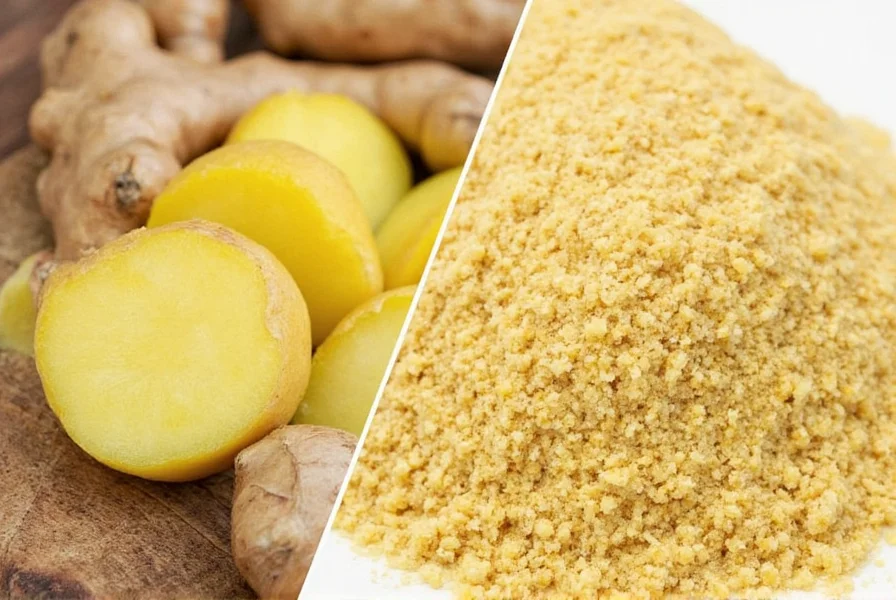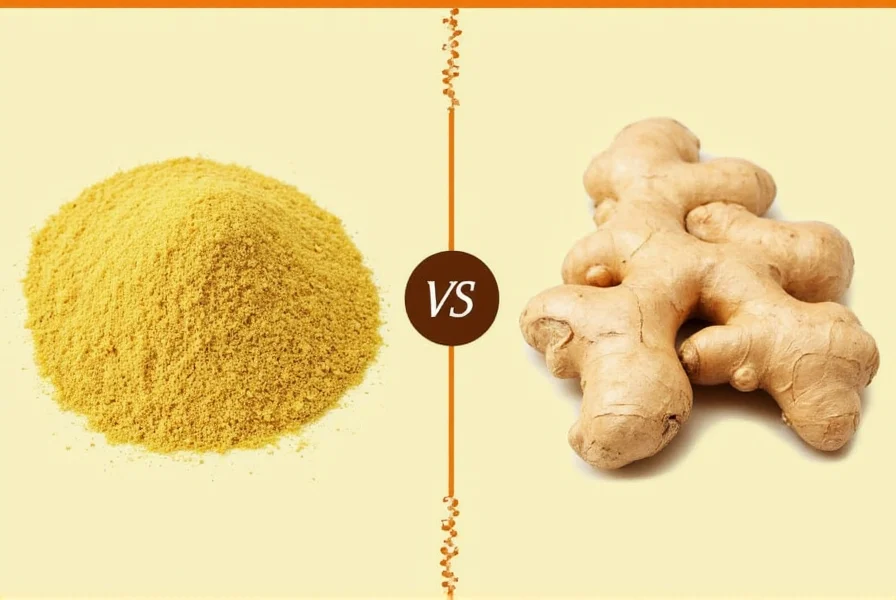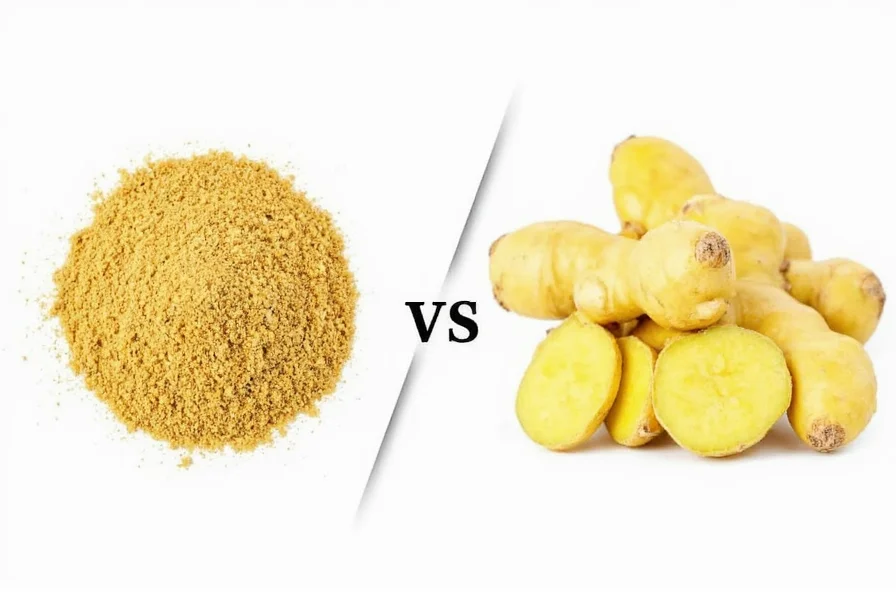Understanding the differences between ground ginger and fresh ginger is essential for achieving perfect results in your cooking and baking. Both forms originate from the same rhizome but undergo different processing methods that significantly impact their flavor, potency, and ideal culinary applications.
Flavor Profile Comparison
When comparing ground ginger vs fresh ginger, the most noticeable difference lies in their flavor profiles. Fresh ginger delivers a bright, zesty, and complex flavor with citrusy notes and a pronounced spicy kick. Its taste is vibrant and multidimensional, changing as it cooks. Ground ginger, being dried and powdered, offers a warmer, more concentrated flavor with subtle sweetness and less of the sharp bite found in fresh ginger.
The drying process transforms ginger's chemical composition, reducing the volatile compounds responsible for fresh ginger's pungency while concentrating certain warming elements. This is why ground ginger works exceptionally well in baked goods like gingerbread, where its mellow warmth complements other spices without overwhelming them.
Nutritional Differences Between Ginger Forms
While both forms provide health benefits, there are notable nutritional differences between ground ginger and fresh ginger. Fresh ginger contains higher levels of gingerol, the compound responsible for many of ginger's health properties, including anti-inflammatory effects. However, ground ginger has higher concentrations of shogaol, formed when gingerol dehydrates, which may offer different health benefits.
Per tablespoon, ground ginger contains more concentrated nutrients due to its dehydrated state, but fresh ginger provides hydration benefits and enzymatic properties that are partially lost during the drying process. When considering fresh ginger vs powdered ginger nutritional value, remember that you typically use less ground ginger in recipes, affecting the actual nutrient intake per serving.
Ground Ginger to Fresh Ginger Conversion Guide
One of the most practical aspects of understanding ground ginger vs fresh ginger is knowing proper substitution ratios. The ground ginger to fresh ginger ratio isn't a simple 1:1 conversion due to differences in moisture content and flavor concentration.
| Ground Ginger | Fresh Ginger Equivalent | Best For |
|---|---|---|
| 1/4 teaspoon | 1 tablespoon grated | Baking recipes |
| 1/2 teaspoon | 2 tablespoons grated | Smoothies, teas |
| 1 teaspoon | 1/4 cup grated | Savory sauces, marinades |
This ground ginger vs fresh ginger conversion chart helps prevent recipe failures. Using too much ground ginger can result in an overpowering, bitter flavor, while insufficient fresh ginger might not provide enough ginger presence. When substituting, always start with less than you think you need and adjust to taste.
Culinary Applications: When to Use Each Type
Understanding when to use ground ginger instead of fresh is crucial for recipe success. Fresh ginger shines in applications where its bright, spicy notes can enhance other ingredients without becoming overwhelming:
- Savory dishes: Stir-fries, curries, and marinades where fresh ginger's complex flavor profile adds depth
- Beverages: Fresh ginger tea, smoothies, and cocktails where its zesty character comes through
- Raw preparations: Salad dressings, sushi accompaniments, and fresh sauces
Ground ginger excels in applications where a consistent, mellow warmth is desired:
- Baking: Gingerbread, cookies, cakes, and other baked goods where its concentrated flavor distributes evenly
- Dry rubs and spice blends: Curry powders, pumpkin spice, and other mixed spice preparations
- Long-cooking dishes: Stews and braises where fresh ginger would lose its distinctive character

Storage Considerations and Shelf Life
Storage requirements differ significantly between these ginger forms. Fresh ginger root, when stored properly in the refrigerator (wrapped in paper towel inside a plastic bag), maintains quality for 2-3 weeks. For longer storage, freeze fresh ginger—it lasts up to six months and can be grated directly from frozen.
Ground ginger, when stored in an airtight container away from light and heat, retains optimal flavor for 2-3 years, though it gradually loses potency over time. The shelf life of ground ginger vs fresh ginger makes ground ginger more convenient for occasional users, while frequent cooks might prefer keeping fresh ginger on hand.
Cost Analysis and Practical Considerations
When evaluating fresh ginger vs powdered ginger cost effectiveness, consider both price per ounce and usage rates. While ground ginger appears more expensive per ounce, you use significantly less of it in recipes. A single fresh ginger root (about 2 ounces) costs approximately $0.50-$1.00, while an equivalent amount in ground form costs about $0.25-$0.50.
For occasional bakers, ground ginger offers better value with minimal waste. Regular cooks who use ginger in multiple weekly meals might find fresh ginger more economical and versatile. The best ginger for baking recipes is typically ground, while fresh ginger works better for most cooking applications requiring ginger's distinctive bite.

Expert Recommendations for Optimal Results
Chefs and food scientists recommend keeping both forms of ginger in your pantry for maximum versatility. For recipes specifically calling for fresh ginger, don't substitute ground ginger without adjusting quantities—this fresh ginger substitute ground ginger mistake is common among novice cooks.
When making your own ground ginger from fresh, peel and thinly slice fresh ginger, dehydrate until brittle, then grind to a fine powder. This homemade version has superior flavor to commercial ground ginger but requires significant preparation time. For most home cooks, purchasing high-quality ground ginger from a reputable spice merchant provides the best balance of convenience and flavor.
Frequently Asked Questions
Can I substitute ground ginger for fresh ginger in recipes?
Yes, but with proper conversion. Use 1/4 teaspoon of ground ginger for every tablespoon of fresh ginger called for in the recipe. Remember that the flavor profile will differ—ground ginger provides a warmer, less spicy taste than fresh ginger.
Which has more health benefits: ground or fresh ginger?
Both offer health benefits but with different compounds. Fresh ginger contains more gingerol (anti-inflammatory), while ground ginger has higher shogaol concentrations. Fresh ginger provides hydration benefits, but ground ginger offers more concentrated nutrients per volume due to dehydration.
Why does my recipe specify fresh ginger instead of ground?
Recipes specify fresh ginger when the bright, spicy, complex flavor is essential to the dish. Fresh ginger works better in savory applications, beverages, and raw preparations where its distinctive bite enhances other ingredients. Ground ginger would provide a different flavor profile and texture.
How do I store fresh ginger to maximize shelf life?
Store fresh ginger root in the refrigerator wrapped in a paper towel inside a plastic bag or airtight container. This maintains moisture balance and prevents mold. Properly stored, fresh ginger lasts 2-3 weeks. For longer storage, freeze it—frozen ginger lasts up to six months and can be grated directly from frozen.
Does ground ginger lose potency over time?
Yes, ground ginger gradually loses potency but remains safe to consume. Properly stored in an airtight container away from light and heat, ground ginger maintains optimal flavor for 2-3 years. After this period, it won't spoil but will have diminished flavor impact in recipes.











 浙公网安备
33010002000092号
浙公网安备
33010002000092号 浙B2-20120091-4
浙B2-20120091-4